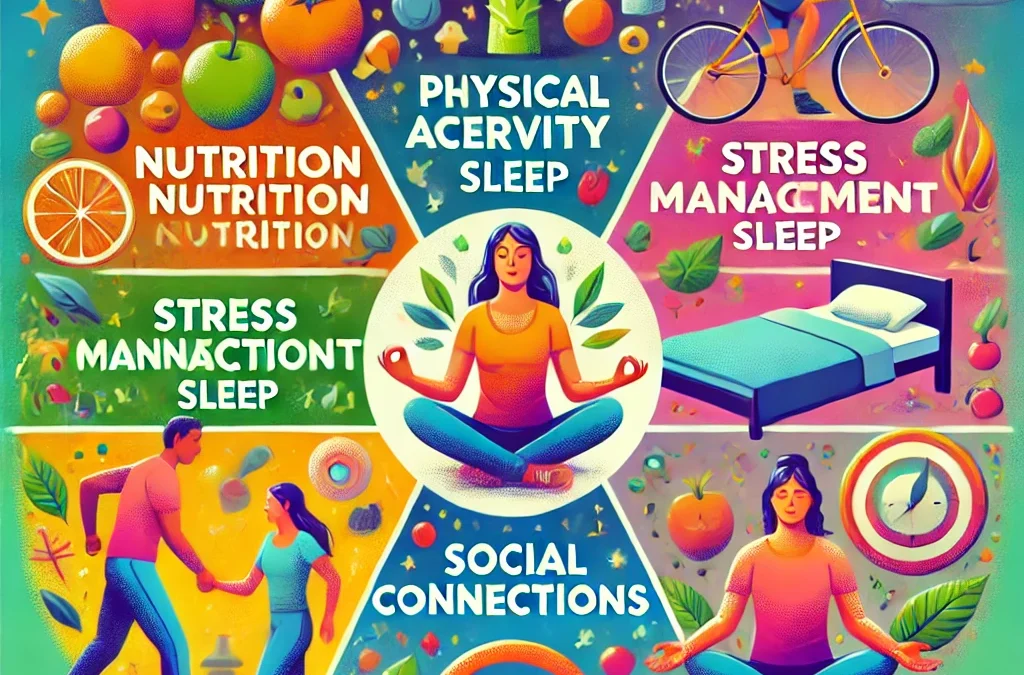Lifestyle Medicine: A Holistic Approach to Health and Healing
In an age where chronic diseases such as heart disease, diabetes, and cancer are on the rise, the importance of addressing the root causes of these conditions has never been more critical. Traditional medicine often focuses on treating symptoms with medication or surgery, but a growing movement known as Lifestyle Medicine is shifting the focus towards preventing, managing, and even reversing diseases by making positive lifestyle changes.
Lifestyle Medicine emphasizes the power of daily habits—what you eat, how much you move, how well you sleep, and how you manage stress—as the cornerstone of long-term health. This holistic approach has gained widespread attention for its ability to improve not only physical health but also mental and emotional well-being.
What Is Lifestyle Medicine?
Lifestyle Medicine is an evidence-based medical practice that aims to prevent and treat diseases by promoting healthy lifestyle behaviors. It focuses on six key pillars:
- Nutrition
- Physical Activity
- Sleep
- Stress Management
- Social Connections
- Avoiding Risky Substances
Unlike traditional approaches, which may rely heavily on medications or surgeries to manage chronic conditions, Lifestyle Medicine encourages patients to adopt healthy, sustainable habits that address the underlying causes of illness. It emphasizes a whole-person approach, integrating both mind and body to create lasting health improvements.
The Six Pillars of Lifestyle Medicine
- Nutrition: Food as Medicine
The foundation of Lifestyle Medicine is a plant-predominant, whole-food diet rich in fruits, vegetables, legumes, whole grains, nuts, and seeds. Research has shown that a diet rich in nutrient-dense, minimally processed foods can reduce the risk of chronic diseases, promote weight management, and improve mental health.
For example, the Mediterranean diet, which emphasizes olive oil, vegetables, fish, and whole grains, has been linked to lower rates of heart disease and longer life expectancy. Similarly, plant-based diets are shown to lower blood pressure, cholesterol levels, and the risk of Type 2 diabetes.
- Physical Activity: Move More, Live Longer
Regular physical activity is another cornerstone of Lifestyle Medicine. Exercise helps manage weight, improves cardiovascular health, strengthens muscles and bones, and boosts mental health by releasing endorphins that promote a sense of well-being.
The recommendation is 150 minutes of moderate-intensity aerobic activity per week, combined with muscle-strengthening exercises. Physical activity also reduces the risk of chronic conditions such as obesity, hypertension, and Type 2 diabetes.
- Sleep: Restorative Sleep for Optimal Health
Good quality sleep is essential for the body’s healing and recovery processes. During sleep, the body repairs tissues, balances hormones, and strengthens the immune system. Poor sleep has been linked to an increased risk of heart disease, obesity, and mental health disorders.
Lifestyle Medicine advocates for creating healthy sleep habits such as establishing a regular sleep schedule, limiting screen time before bed, and creating a calming bedtime routine to support restorative sleep.
- Stress Management: Mastering Your Mind
Chronic stress has been shown to contribute to numerous health problems, including high blood pressure, heart disease, depression, and anxiety. Learning how to effectively manage stress is a key aspect of Lifestyle Medicine.
Practices such as mindfulness, meditation, deep breathing, and yoga can help calm the nervous system and reduce the body’s stress response. Regularly practicing these techniques can improve resilience and mental clarity, promoting overall well-being.
- Social Connections: The Importance of Relationships
Humans are social creatures, and strong social connections are crucial for both mental and physical health. Studies have shown that people who are more socially connected have lower levels of anxiety and depression, better self-esteem, and a longer lifespan.
Lifestyle Medicine encourages individuals to foster supportive relationships and engage in social activities, whether through family, friendships, or community involvement. Positive relationships provide emotional support, reduce feelings of loneliness, and enhance quality of life.
- Avoiding Risky Substances: Prioritizing Healthy Choices
Avoiding risky substances such as tobacco, excessive alcohol, and recreational drugs is fundamental in maintaining health. Smoking and excessive alcohol consumption are linked to a wide range of diseases, including cancer, liver disease, and cardiovascular problems.
Lifestyle Medicine emphasizes making healthy choices that protect and preserve your well-being. Quitting smoking, reducing alcohol consumption, and avoiding other harmful substances can dramatically improve long-term health outcomes.
The Impact of Lifestyle Medicine on Chronic Disease
The primary goal of Lifestyle Medicine is to prevent and manage chronic diseases through lifestyle interventions. Numerous studies have demonstrated that adopting healthy lifestyle habits can significantly reduce the risk of developing conditions such as heart disease, Type 2 diabetes, obesity, and cancer.
For instance, a comprehensive study by the American College of Lifestyle Medicine found that adopting healthy lifestyle practices can reverse the progression of Type 2 diabetes in some patients. Similarly, individuals who prioritize regular physical activity, a healthy diet, and stress reduction are less likely to develop cardiovascular diseases.
Lifestyle Medicine also has a profound impact on mental health. Practices such as mindfulness and stress management have been shown to reduce symptoms of depression and anxiety, enhance mood, and improve cognitive function.
How to Get Started with Lifestyle Medicine
Getting started with Lifestyle Medicine doesn’t require drastic changes; small, incremental steps can lead to significant improvements in health. Here are a few tips to help you begin:
- Start with one area: Focus on one pillar of Lifestyle Medicine at a time, such as improving your diet or increasing physical activity. As you gain momentum, you can gradually incorporate other healthy behaviors.
- Set realistic goals: Set achievable, specific goals, such as eating five servings of fruits and vegetables each day or walking 30 minutes five times a week.
- Seek support: Partner with a healthcare professional who specializes in Lifestyle Medicine or join a community that supports healthy living.
- Practice mindfulness: Incorporate mindfulness practices like meditation or deep breathing into your daily routine to manage stress.
- Create a healthy sleep routine: Prioritize sleep by setting a regular bedtime, avoiding caffeine late in the day, and creating a relaxing bedtime environment.
Conclusion
Lifestyle Medicine offers a powerful, proactive approach to health and well-being by focusing on daily habits and preventive care. By adopting the six pillars—nutrition, physical activity, sleep, stress management, social connections, and avoiding risky substances—you can take control of your health, reduce the risk of chronic diseases, and live a more fulfilling life. Ultimately, the power to improve your health lies in your hands, one healthy habit at a time.





Recent Comments